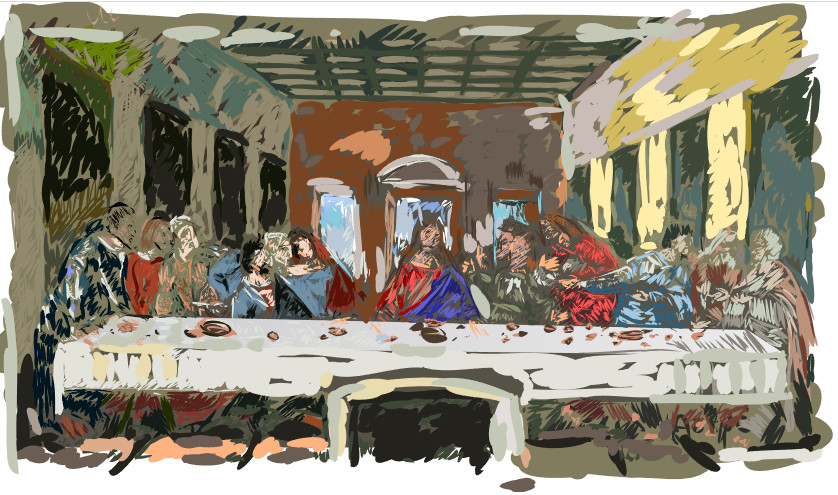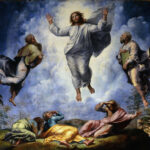Let’s see if I can pull this off: 4 articles to be published for the Holy Week, possibly somehow being concise.
Holy Thursday -Evening Mass of the Lord’s Supper

I deliberately chose a (public domain) derivative work from Leonardo Da Vinci’s Last Supper that I find somewhat ugly. Appropriately symbolic this way: in pushing for a fresh reinterpretation and trying to bridge a work of art to the abstract form, both the artistic and the didactic value are basically lost.
Too many interesting topics today! I’ll save any comments on the institution of the Eucharist for another occasion. Deserves a proper dissertation.
We’re presented with this unique event, Jesus washing the feet of the Apostles, which I’d describe as quite modern, indeed fashionable. And this episode steals the show a bit from all the rest, especially considering it’s the subject of today’s reading, from the Gospel according to John.
A message that evaporates
Take a truth that is profound but difficult to grasp. Bring it out; after the first difficulties and some resistance, this truth will create an opportunity for a change in mentality that will make the world a better place.
And yet, after a significant amount of time, through repetition, trivialization and mental fatigue, it will become a shadow of itself: tiredly reiterated by believers who’ve lost touch with the fresh enthusiasm of discovery, and consider it a corny banality.
Paradoxically, what was once deep and momentous will be transformed into something entirely different; similar yes, but not even true anymore! The Devil is God’s monkey, as they say. A runaway truth becomes evil.
Branches detached from the vine: we’ve been warned they’re doomed to wither (Jn 15:4). Fundamental truths for our faith are transformed into pretexts for social demands: this is a gross mistake.
Behold this Jesus: though clad in divine royalty, he’s already anticipating his extreme act of self-immolation, through an atrocious and humiliating death. And now he proceeds to wash the dusty feet of the Apostles. Once again astonishing them, causing indignation (though Peter’s reaction is actually comical, I’ll get back to it one day). How come! You, you! Behaving like the lowest of servants?
Once again: here’s our Christian foolish wisdom at play. Overturning expectations, elevating what is small, reaching down to extend a helping hand; scoffing at deceptive human honors, choosing instead to become a brother and indeed a servant of others.
…And we managed to make all this seem trivial! Mind-boggling.
This Thursday, as seen by others
What is realistically left of this rich tradition, for the men and women of today? We must come to terms with a fact: these celebrations are almost invisible. The only echo that reaches the general public, at least here in Italy, is represented by journalists commenting on the ritual washing of feet during the Holy Thursday’s mass celebrated by the pope (or by someone of his choosing if he’s impeded by advanced age).
Usually you’d hear about that during the last segment of the evening news report, when viewers are even more distracted than normal…
In this ritual one notices the careful selection of the recipients for the privilege, chosen to maximize the media impact: they may include a Muslim, a homeless person, a disabled person, an atheist, a homosexual… Who knows what extra special categories will be included next time in such a publicity stunt. Their feet are to be washed by the pope: a sign that they deserve a special honor, as if it were a long overdue signal. This is the idea. Not explicitly, but that’s the perception; a privilege for the unprivileged, signaling everything was unjust before.
Imitating the Pope, perhaps only for the benefit of the smallish echo chamber represented by local newspapers, many bishops also stage a politically correct rite. Where migrants, inmates, minorities, those who explicitly reject Christian morality, people who aren’t even Christian, become the poor victims/the good guys to be showered with honors.
Case in point: today the archbishop of Naples celebrates mass in a Gypsy camp. The pope returns to a juvenile prison. The archbishop of Manila will wash the feet of a heterogeneous group, where journalists point out we can find representatives of indigenous communities, humble laborers, the LGBT world.
The humiliation of washing the feet of a stranger, even if reduced to a symbol, becomes a self-explanatory gesture: a recognition through gritted teeth that the pope, and even more so his own people, should be ashamed of who they are and renounce their privileges.
As enacted by Jesus, the act of washing feet (for the English world, it became known as Maundy) represented a clear provocation, a call for conversion, but this was possible because there was a solid foundation: the recipients viewed him as the Messiah; the Master they loved, revered, worshiped eventually. That’s why the Apostles were so embarrassed.
But when Maundy is celebrated in this fashionable way, by a clergy class that cannot expect to obtain any respect from the World, the result is that of sending a diametrically opposite signal!
From Our Savior people learn humility: through His noble example. From submissive priests, who espouse modern stereotypes about bottom up power structures, identity politics and collective guilt, people are induced to express arrogance towards them, and to fuel a permanent struggle between social groups.
Superficial
The way people from outside seem to appreciate this washing of the feet reminds me of a similar phenomenon: the ominously worldly Catholic fool is enthralled by the sign of peace during mass, as if it were a central point of the rite and not an addition of minimal significance. Is the sacrifice of Christ in the Eucharist made present once again in a bloodless way at the Mass? Not at all, they seem to imply; mass is above all an opportunity to come together, an assembly in which we gaze into each other’s eyes and whisper: “Peace!” Isn’t this beautiful?
Similarly: can you, O Progressive, appreciate the rich symbolism, the complex theology laying behind today’s liturgy? Oh no, it’s all very simple. The point is that the Catholic Church must do only one good, essential thing (and after all that’s always been the case): lend a helping hand, wash feet, perform what your bigoted grandparents called corporal works of mercy. And while we’re at it, make amends for our Church’s faults, demolish the hierarchical structure.
Do these priests and bishops really believe they can get away with a symbolic gesture once a year, to save face, and then go back to unilaterally managing their patriarchal power system? They should get off their high horse! This is just the beginning.
How modern: in the eyes of the spectators, this is a rite that symbolizes the reduction of the Church to an agency of social workers.
“Bend down and roll up your sleeves, solve material problems, this is our mental horizon!”
Thy neighbor!
No way Jesus would have even contemplated the thought of washing the feet of random strangers. He chose the Apostles because charity begins with those that are closest to you.
Want a foot wash rite done right? The Pope should act as a servant for a group of bishops, at most here a few priests could be included. Similarly, the bishop should only wash the feet of priests. Because Christian love is not an extemporaneous gesture towards distant people that one will never meet again, on the contrary it’s a commitment, to improve relationships with those with whom we normally relate. There is an order to things.
And God only knows… er, actually… many know, how much our clergy needs a change of tone, after being mistreated by their superiors for years. And that includes, first and foremost, anti-traditionalist rants and dictatorial decrees coming directly from the pope.
Yes, it’s technically true that the principle behind this gesture, highlighting the value of service and self-humiliation, is transferable to all levels; that’s why in theory this stunt could even be staged by a priest for a group of parishioners, or even for people outside the community. But every action derives its value from what it communicates; when a rite might be typically misunderstood, not performing it becomes a duty!
So… washing the feet of unbelievers: no, because you wouldn’t help them understand that from your point of view they are in error, and you have a Gospel to announce;
washing a Muslim’s feet: absolutely not! Because (assuming he takes his religion seriously) he would interpret it as a proper act of submission to Islam;
washing the feet of someone whose life is visibly in contrast with Christian morality: again, no. This person must understand that a conversion is what’s expected from him/her, which is the exact opposite of a debased, therapeutic, insipid Christianity that simply tells you that people must accept you as you are.
Even washing the feet of a representative of a neutral category, i.e. not morally questionable and also a Catholic, all things considered is still a no-no: this kind of framing in fact shifts the accent from the individual to their belonging to a group. Being a Christian means looking at a concrete person, in his/her uniqueness. Inside a church you’re neither black, nor white, Indio or Indigo. It’s you, just you. If I begin to treat you as a representative of a social group, I’m creating barriers, opportunities for politicization and conformity.
In short, given that today the institution of priesthood is also celebrated….
Here’s an unsolicited piece of advice that won’t be read anyway: a priest should go back to being a priest: embodying the essence of sacred, instead of arbitrarily desecrating, hoping to become one of us. A mate/companion/comrade.
And even more so, this applies to the bishop and the pope. They have to accept the burdens that their office entails, including a separation from the rest of society; a necessary solemnity that should keep them from living a normal life, or being tempted to become popular through politically fashionable initiatives. They should know by heart that washing the feet of a layman is too imprudent. More than anything else, they should remember they’re not really running the show.










































